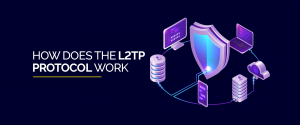

Get 93% OFF on Lifetime
Exclusive Deal
Don’t miss out this deal, it comes with Password Manager FREE of cost.
Get 93% off on FastestVPN and avail PassHulk Password Manager FREE
Get This Deal Now!By Nick Anderson No Comments 5 minutes
A protocol is an essential pillar of a VPN that establishes and authenticates a VPN connection. Multiple VPN protocols exist today, each offering something that gives it a unique footing against other protocols. Layer 2 Tunneling Protocol (LT2P) was introduced two decades ago, and it continues to be one of the common VPN protocols today.

FastestVPN supports LT2P in its apps. You have the flexibility to choose between VPN protocols. If you are curious to learn about it, we’ll cover all the details you need to know about the L2TP protocol in this blog.
A protocol is a set of rules that dictate the transmission of data. It sets the guidelines so that there is no loss of data due to incompatibility. In a VPN, it defines what port will be used for communication, what encryption will be used, how the authenticate will occur, among other things.
Microsoft and Cisco jointly developed L2TP in the 90s. It serves as a successor to Point-to-Point Tunneling Protocol (PPTP) which is now considered obsolete and not recommended for security reasons.
As a tunneling protocol, LT2P provides encapsulation of data over an existing network between two points. LT2P’s encryption was felt adequate, but over time, the need for more robust security emerged. Hence, LT2P is usually paired with a stronger protocol like IPsec for encrypting data packets inside the L2TP tunnel and for authentication.
Encryption is the fundamental technology that allows a VPN to hide your data. It is the process of scrambling data into an unreadable format. Encryption relies on a mathematical algorithm, called a cipher, to manipulate data. A special key is required to decrypt the data.
The VPN server decrypts the incoming data packets, then relays them to the destination. VPN encrypts the actual payload (which contains the actual content of the packet) inside another packet and encrypts it. Only the header information remains visible for the data packet to arrive safely at its intended destination.
Encryption prevents any third party, such as the internet service provider (ISP), from monitoring your activity.
IPsec itself is a complete VPN protocol that provides tunneling, key exchange, authentication, and encryption. It is preferred because of its robust encryption capability, particularly the cipher suites available.
All of this sounds complex but works incredibly simple in practice. FastestVPN connects you to the VPN server and handles the rest. You just need to focus on browsing the web, and FastestVPN will ensure your data is encrypted.
Is L2TP secure is one of the most common questions when the protocol is concerned. It’s possibly due to PPTP’s reputation as the least secure VPN protocol out there and because L2TP was promoted as its successor.
On its own, L2TP is vulnerable to data theft and surveillance as it does not have encryption. It is simply a protocol that provides tunneling capability between two endpoints. It can be used to create a private network over the public network between two company branches. But when it comes to concealing data, LT2P requires the help of IPsec.
What you have to keep in mind is that L2TP is decades old now. Much has changed since then. Furthermore, the NSA is said to have comprised the protocol.
L2TP is an old protocol that has been superseded by new and more powerful VPN protocols such as OpenVPN. Most of the industry has moved away from the LT2P protocol, but it may still be useful for some users.
However, while LT2P is easy to set up, using IPsec with it requires additional configuration that would be time-consuming and complex. In contrast, other VPN protocols have built-in encryption for that.
FastestVPN allows you to switch protocols. By default, the FastestVPN app will connect you to the IKEv2 protocol considering the best security and speed and connection reliability on mobile devices. We recommend using IKEv2 and OpenVPN if you are not facing connectivity issues.
LT2P uses port 500 and port 4500, which firewalls can often block. Newer VPN protocols like OpenVPN can work on TCP port 443, which is also used by HTTPS traffic. It’s harder for ISP providers to detect OpenVPN traffic from HTTPS traffic.
FastestVPN features the leading VPN protocols, including OpenVPN, IKEv2, L2TP/IPsec. It is built to safeguard your identity on the internet with DNS/IP leak and WebRTC leak protection.
All VPN servers use AES 256-bit encryption (subject to protocol’s capability). You don’t need to go through the trouble of configuring L2TP/IPsec on your device; simply download FastestVPN, connect to a VPN server, and start browsing the web securely and privately.
© Copyright 2025 Fastest VPN - All Rights Reserved.


Don’t miss out this deal, it comes with Password Manager FREE of cost.
This website uses cookies so that we can provide you with the best user experience possible. Cookie information is stored in your browser and performs functions such as recognising you when you return to our website and helping our team to understand which sections of the website you find most interesting and useful.
Strictly Necessary Cookie should be enabled at all times so that we can save your preferences for cookie settings.
If you disable this cookie, we will not be able to save your preferences. This means that every time you visit this website you will need to enable or disable cookies again.